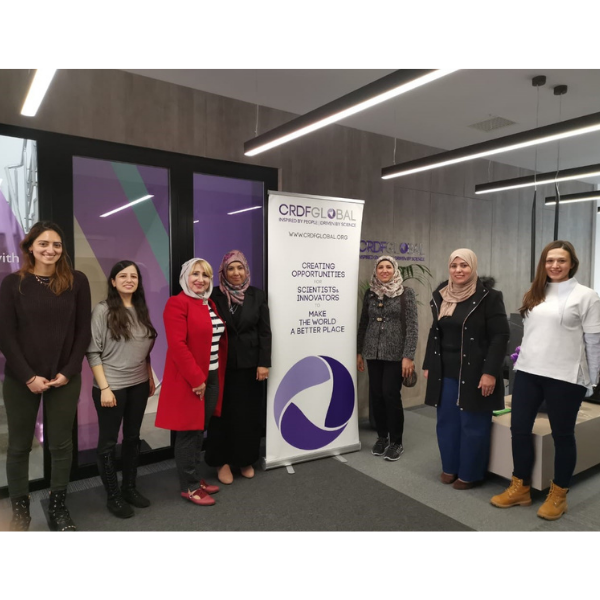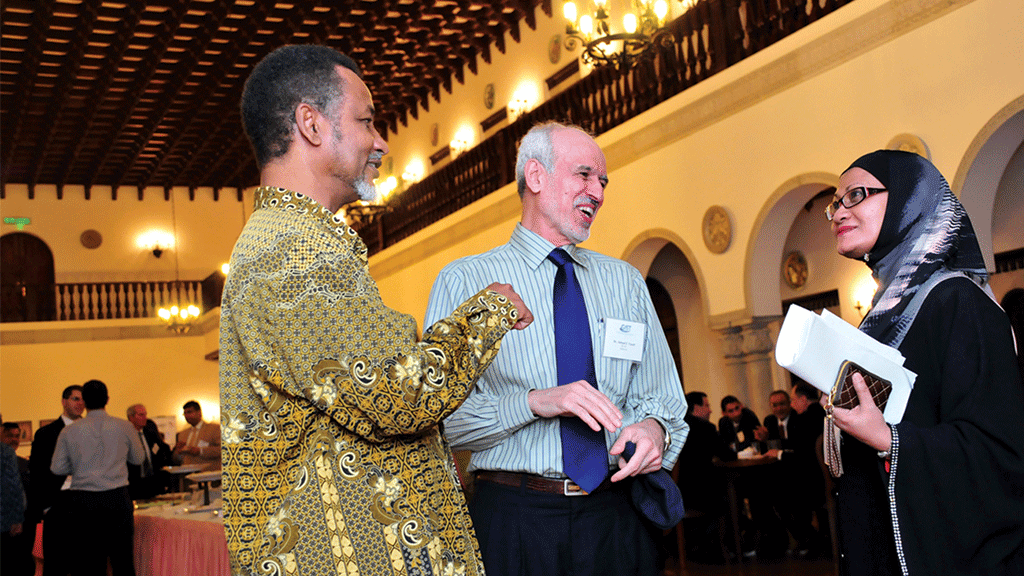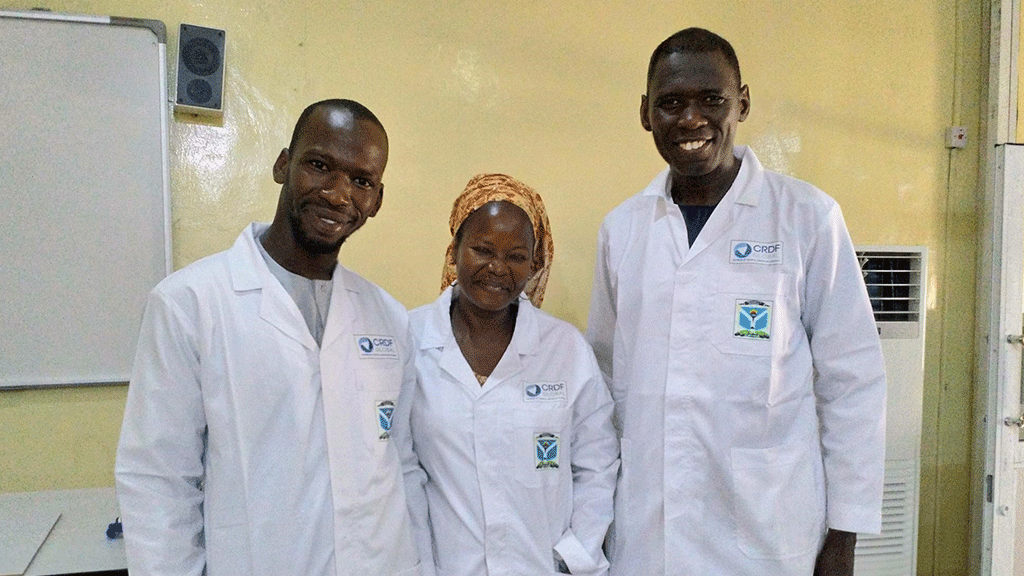Advancing Knowledge, Fostering Connections: A Q&A with the 2020 WomenAdvance: Chemical Security Fellows

The WomenAdvance: Chemical Security program is an initiative led by CRDF Global, with support from Global Affairs Canada, to promote and support the leadership of women in chemical security and nonproliferation while contributing to the Republic of Iraq’s ability to prevent and respond to threats caused by the misuse of chemicals. This year, the program gave four chemical security specialists from Iraq a chance to collaborate with the Royal Scientific Society (RSS) in Jordan.
Throughout the program, the fellows learned strategies for improving chemical security within their sectors while building leadership skills as senior leaders at their institutions. Members of our Jordan office sat down with fellows Sahab Nasif Jassim and Nagham Mahdi Rhadi, of the Ministry of Industry and Minerals of Iraq, and Luhaib Jawad Al-Mihyawi and Farah Awad Ahmed, of the Iraqi National Monitoring Authority, to speak more about their fellowship experiences.
The fellows are denoted as follows:
Farah Awad Ahmed: FA
Nagham Mahdi Rhadi: NM
Luhaib Jawad Al-Mihyawi: LA
Sahab Nasif Jassim: SN
Now that the fellowship is over, what can you share with us about your experience in Jordan? What are you taking home with you, and what’s next?
LA: “It was a great opportunity to learn from a fellow brother country. We share similarities in the chemical field, yet the differences in systems and issues faced is something that we can both learn from one another.”
FA: “I am very excited at the opportunity to share my experience, specifically, the connections made, and the suggested tools and resources I can provide.”
NM: “It was great to be here, everyone we met was so welcoming and ready to share their knowledge with us. It was a pleasure to see such accomplished Arab females and males. The Royal Scientific Society (RSS) and its capabilities remind us of the importance of practical research and testing that will enhance the industrial sector and support its innovation, which is something we are currently lacking. Given the situation in Iraq, most of our research is university or educational-based and has not been moved out of paper form. It’s just theories on paper. In the long term, [practical research and testing] will affect our industrial growth and, most importantly, finding solutions to our issues…I am excited to share my experience with other women, to tell them about my time here, and to encourage them to always apply to such opportunities. I want them to get strength from my experience.”
When the fellowship competition was first announced, what was your reaction? What were the reactions of your colleagues at your institution?
FA: “At first, I couldn’t believe it. I asked to see the notice myself to even comprehend that there was an opportunity targeting women in our sector. This is something that has never happened to us before. Women in our sector need more regional and international exposure.”
SN: “Even our male colleagues were looking to apply. They are not used to opportunities that are for women only. It caused a stir, but a positive one. The women I know were all talking about it! Finally, there is something that is for women and in our line of work. We hope that as we see more support towards us, this will incentivize more women to join the workforce.”
NM: “When the announcement was distributed, I thought ‘this is my chance’. I went home that night and spoke to my husband, since leaving for almost a month is not easy, we have our jobs, our home, and our children. I told him that I could not let this opportunity go to waste. He was the one who encouraged me to apply. That night, I had prepared, or should I say overprepared, myself to speak to management in the morning and submit my written request for approval to apply. When I walked in and presented my report, my manager was shocked. He asked why there were so many pages! That’s when I noticed that as women, we do not have that many opportunities, especially in our sector, so we tend to overcompensate out of fear of refusal. We have the same credentials, education, and experience as our male colleagues, but there always seems to be that fear. So, the application process was a learning process in itself.”
LA: “Two thoughts went through my head; first, we as Iraqi women must apply to this opportunity because a lack of applications will show a lack of commitment. My second thought was about all the female employees in my workplace; many of them are junior. I wanted to be a role model for them. I wanted to show them that it can be done. You can manage your work and home life; you can ask for support in your family. Most importantly, it’s okay to think of yourself and do things that will advance your career.”
Did you feel any push back from your community or workplace?
NM: “Not at all. My colleagues at work and most of my team consists of male members. In my management position, I have been able to build an atmosphere of trust based on [a person’s] work and input, not [their] gender. My husband has always been my biggest supporter, we have been married for over 20 years, and he understood from the start how important my career and its advancement are to me.”
FA: “My male colleagues encouraged me to apply and told me not to waste this opportunity, and they shared their experiences from similar activities. I am the only female on the team so getting an opportunity like this was uplifting.”
What elements of our fellowship did you enjoy? Were you exposed to something new?
FA: “For me, the inclusion of the civil defense was wonderful, I had never been exposed to that side of the sector before. It was eye opening to see their labs, equipment, and capabilities. It showed me that with my studies and experience, I can engage in different areas of work that were unknown to me. It piqued my interest and it is something I will consider seriously.”
SN: “Our visit to the Jordanian Ministry of Environment was a pleasure. They were so welcoming and engaged in very open and transparent conversations with us. It wasn’t one of those instances where we were just being lectured. We were able to share our problems and understand how they were able to overcome these issues. Since they saw our CV’s prior to our arrival, they also shared their issues with us and asked us for recommendations. Basically, our discussion was built on learning from one another and we will be continuing this conversation and sharing resources.”
LA: “I learned more about the RSS, its labs and testing capabilities, its focus on water and environment implications, and its steps for green chemistry. They also exposed us to internationally available monitoring tools and systems and showed us how to become members. Given the situation in Iraq, it feels that we have some lost years to recover, so it was good to be exposed to what a neighboring country is doing, so we know how we need to plan ahead.”



